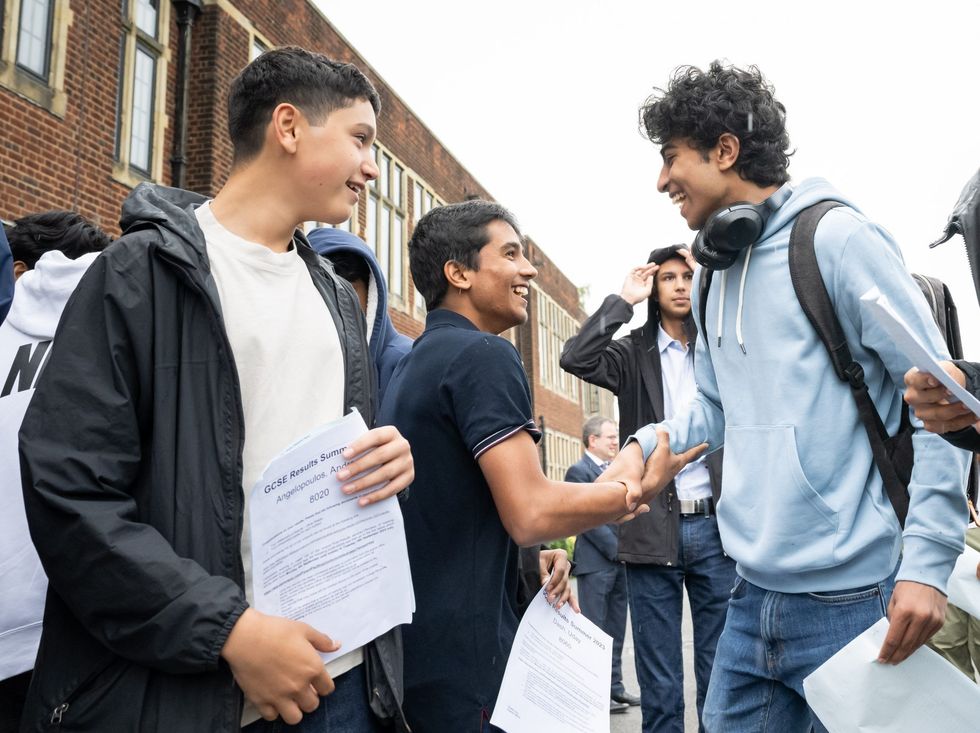MORE than 640,000 students received their GCSE results today, while an additional 390,000 pupils got their vocational qualifications.
The distribution of top grades (grade 7 and above) and standard passes (grade 4) remains consistent with the figures from 2019, reflecting the return to normal grading standards, the Department for Education said.
Students who collected their results today will advance towards doing their A levels or apprenticeship, vocational technical qualifications (VTQs), and T Levels.
This year marks the first instance of grading returning to its normal state since the pandemic, aligning with the framework established by England’s exam regulator, Ofqual, more than two years ago.
Top grades for 16-year-olds, in line with 2019, stand at 22.4 per cent, demonstrating an increase of 0.6 percentage points (ppt) compared to 2019.
This year's results reveal that 70.3 per cent of entries attained a grade 4 or higher – meeting the standard pass criteria – which is an improvement of 0.4 ppt from 2019.

At Queen Elizabeth school Barnet, around 1,535 were awarded grades 9 or 8 this year – equivalent to the old A* – a 2.4 per cent increase on 2019, a press release said.
The increase took this measure to 81.8 per cent of all results.
For grade 9 alone, there was a 1.3 per cent increase, and for grades 9–7 (previously A* and A), the increase was two per cent.
In mathematics, 83 per cent of the 190 students gained a grade 9 (with no results lower than a 7) - and in sciences, 85 per cent of those taking individual biology and physics secured 9s, and 78 per cent for chemistry.
Headmaster Neil Enright said, “GCSE results in recent years have been very strong here, so they had a lot to live up to, but thanks to their hard work and to the dedication and detailed approach of their teachers, they have not only held their own, but have made incremental improvements on the record of their predecessors.
“This consistency of excellence sets our Year 11 pupils up well for Sixth Form studies and for exciting future opportunities at university and in their careers.”
John Lyon school in northwest London praised its pupils for their GCSE results.
Jayden attained straight 9s alongside an A in HPQ (Higher Project Qualification) and intends to pursue law at university.
He said, “I’m delighted with my straight 9s. I’ve put in a lot of hard work and now I look ahead to the next challenge: my A-Levels.”
Another student, Kiran received eight 9s, two 8s, and a B in HPQ. He holds Grade 8 guitar proficiency and has completed Grade 8 Lamda with a distinction. He takes part in the school's chess and debating clubs.
Kiran, the recipient of the prestigious Goldhawk Scholarship said, “I’m very happy with my results and that my hard work has paid off. I look forward to studying my A-Levels at Sixth Form. Maths, Further Maths, Chemistry and Economics.”
Another Goldhawk Scholar, Rohan, achieved eight 9s, one 8, and one 7 in his results.
Katherine Haynes, the head of the school, extended her congratulations to the Year 11 students on their exceptional GCSE results. She acknowledged the students' commitment and diligence that led to their impressive grades.
Schools Minister, Nick Gibb said, “Pupils receiving their results today should feel very proud. I want to congratulate them all and give my thanks to the hardworking teaching staff that have helped them throughout this period.
“Today’s results are a testament to this Government’s longstanding work to drive up standards and expanding opportunities for all in our education system.”




